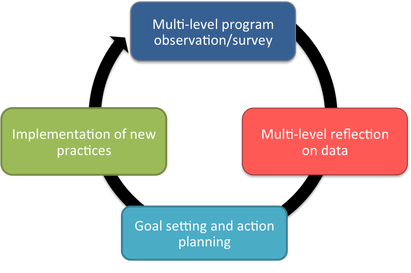The Quality Improvement System: Learning More
The Quality Improvement Process has been working with OST programs in Cambridge for over a decade. See below for more information on each of the pieces of the process, as well as the principles that guide our work.
The Self Assessment Process: APT and OSS

With Quality Coaches, participating programs use the APT observation tool to identify their program's strengths, set goals for improvement, and implement new practices (see below for more information about our use of the APT tool). This model engages members at every level of the organization: front line staff members observe the program in action alongside directors and executive-level managers, and every voice is involved in reflecting and action planning. Similarly, the OSS is completed by staff members, and Coaches lead multi-level site teams in a debrief meeting to discuss survey findings, identify aspects of organizational functioning to improve upon, and develop and implement an action plan.
While the APT tool focuses on the level of OST programming where youth work occurs, the OSS looks at the bigger picture of organizational health in order to support quality on the ground. Both tools are used with the support of a Quality Coach and implemented in continuous cycles, helping programs go deeper in their work every year.
While the APT tool focuses on the level of OST programming where youth work occurs, the OSS looks at the bigger picture of organizational health in order to support quality on the ground. Both tools are used with the support of a Quality Coach and implemented in continuous cycles, helping programs go deeper in their work every year.
Quality Coaching & System Coordination
The Agenda for Children's Quality Coaches are youth development and organizational leadership specialists who have worked in the field of OST for decades, many of them with roots right here in Cambridge. The focus of their work is to build upon the strengths of Cambridge OST programs and support the professionals who provide services to our youth every day, via reflective practice, team building, and leadership development.
Susan Richards, Agenda for Children Co-Director, acts as the Quality Improvement System’s coordinator, facilitating, over the past 10 years, the design, implementation and evaluation of this constantly evolving Quality Improvement System.
To learn more about the Quality Coaches, visit the Who We Are page.
Susan Richards, Agenda for Children Co-Director, acts as the Quality Improvement System’s coordinator, facilitating, over the past 10 years, the design, implementation and evaluation of this constantly evolving Quality Improvement System.
To learn more about the Quality Coaches, visit the Who We Are page.
A Multi-Year Approach
Programs who commit to the Quality Improvement System agree to engage in a multi-year process with a significant time commitment to focusing on quality. In years 1 and 2, programs are introduced to the APT and OSS tools, the self-assessment process, action planning, and program improvement, with increasing intensity. Beginning in year 3, the focus moves to transferring the skills of coaching and facilitation to the leaders within the organization to integrate learned practices, and finally in year 6 supporting long-term sustainability. Throughout the process programs agree to participate in a System-wide learning community, sharing challenges and best practices with peers.
Principles of Practice
The Agenda for Children has identified 7 Principles of Practice that guide the Quality Improvement System. These principles are:
- Striving for excellence in out-of-school time (OST) experiences for all children and youth that include positive relationships and high quality activities.
- Ongoing professional development of OST staff, which requires a commitment to change, support, and accountability.
- Pursuing the organizational conditions and practices necessary for supporting quality programs, including quality supervision and building and sustaining a strong team with a shared vision.
- The importance of self assessment through observation and the use of research-based assessment tools, such as the APT and OSS.
- Action planning based on site-level data and reflective practice that includes all levels of staff in identifying challenges and affirming strengths.
- Integrating and sustaining program improvement through continued self assessment, documentation of processes and outcomes, and institutionalization of policies and practices.
- Building the OST professional community through peer leadership, mutual learning, and sharing of challenges and promising practices.
The APT Observation Tool
In 2001 the Agenda for Children began work with the National Institute on Out of School Time to find the best way to integrate the Afterschool Program Practice Tool (APT) with our model. It was decided that the majority of the Activities section of the APT would be most applicable to the Agenda's approach to quality support. Since then, this customized APT has been used by coaches and program personnel to conduct site-level observations, and in 2014 the Quality Improvement System began the evolution to include the revisions to the APT as defined through NIOST's research studies and improvements. To learn more about the APT, visit NIOST's website.








